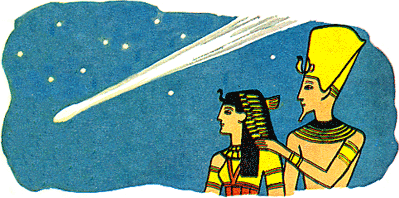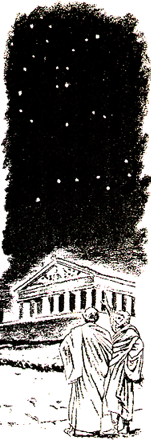
Hare Krsnas call money lakshmi. "Hey, prabhu, got any lakshmi?"
Money kind of sounds like MANI right about now. Mani is a Sanskrit word meaning jewel.
Moving right along, in a circle. In ancient Sumer, according to Zecharia Sitchin's book The Cosmic Code, we find that there is a difference between destiny and fate. Destiny (NAM) is unalterable but fate (NAM.TAR or "fate cut") is alterable. A planet's orbit is its NAM.
 It all gets a little Las Vegas, doesn't it? For this is really a place for Fortune worship,
L. Vegas is. Gamblers are pulling levers, watching things spin. They're throwing little
planets into little orbits in the casinos. Orbs are then spinning within orbits, Wheels of
Fortune are hitting them over their heads. People everywhere in Vegas in ecstatic and esoteric
worship of Fate (gambling), lost and drunk in the spinning planets and orbits, via a bath of neon.
Lady Luck doesn't smile upon them all and some feel so dejected! These dejected devotees of Lady
Luck can also be seen. This is a place for spinning worlds within words, weavers and wovens.
It all gets a little Las Vegas, doesn't it? For this is really a place for Fortune worship,
L. Vegas is. Gamblers are pulling levers, watching things spin. They're throwing little
planets into little orbits in the casinos. Orbs are then spinning within orbits, Wheels of
Fortune are hitting them over their heads. People everywhere in Vegas in ecstatic and esoteric
worship of Fate (gambling), lost and drunk in the spinning planets and orbits, via a bath of neon.
Lady Luck doesn't smile upon them all and some feel so dejected! These dejected devotees of Lady
Luck can also be seen. This is a place for spinning worlds within words, weavers and wovens.On Diwali, the festival of lights, people sometimes engage in cleaning and decorating at the same time as card and dice playing. This makes perfect sense. It's sort of a Fortune twofer. I shall worship Thee, O Lady of Luck and make my house decorated and pretty...and suitable for Thy Pleasure... perhaps I could also win much gold in the card/dice game this afternoon? On that day a vice and a virtue are celebrated simultaneously and why shouldn't they be?
At Jewish weddings, people say Mazal-tov! Mazal-tov! enthusiastically, in a mood of wishing good luck. Sitchen also tells us that this word Mazal-tov is an Akkadian word meaning zodiacal station. Like all pre Big Religion peoples, they followed the stars. This ties in the orbital destinies, or the NAM, and fate, or NAM.TAR in the grand Sumerian tradition. This is the tradition we seem to be forever stuck in the web of.
What's gemini say today?
Goya's painting, The Three Fates, always made me kind of dizzy because they seem to be swirling above
 the clouds, all Cosmic Wheel-like, grotesque, stupid-looking and intimidating. The Three Fates are
called the Moirai. They came out of the endless Yawn of the Vast Black of the universe to protect
the Dike, or Justice (who is blind) the Unalterable Fate. Destiny in ancient Greek is called moira,
which is a word meaning "measured or alloted." In Sanskrit, there's a similar word, called "MA," or
measured, from which words like Matri (meter), Mata (mother), Maya (illusion) come from. The
illusion is the utter faith in absoluteness of the Measured and yet the Measured is all. It's all a
question of perception. It's all about the conduct one chooses to engage in within the Measured World
which is the key.
the clouds, all Cosmic Wheel-like, grotesque, stupid-looking and intimidating. The Three Fates are
called the Moirai. They came out of the endless Yawn of the Vast Black of the universe to protect
the Dike, or Justice (who is blind) the Unalterable Fate. Destiny in ancient Greek is called moira,
which is a word meaning "measured or alloted." In Sanskrit, there's a similar word, called "MA," or
measured, from which words like Matri (meter), Mata (mother), Maya (illusion) come from. The
illusion is the utter faith in absoluteness of the Measured and yet the Measured is all. It's all a
question of perception. It's all about the conduct one chooses to engage in within the Measured World
which is the key.Hmmm...can we fight the hangman's noose of the Great Work of Ages, the control of the many by the very few black magicians?
By hook or by crook, the Robert Altman film, The Three Women, should be seen. The Three Fates, the Three Women of Shakespear's MacBeth, the Weird Sisters (of Norse Mythology) in the California Desert wasteland.
Before Celtic Britain was co-opted by Anglo-Saxon Britain and before Anglo-Saxon Britain was co-opted by Roman Britain, there had always been the worship of Fate, the Three Fates in fact. In Bede's History of the English people, he describes the Modranect, "Night Of The Mothers," in a kind of coded, hushed way, afraid to give us too much detail. After all, the ancient Sumerian (and therefore Judeo-Christian) male god, EL, might not approve. For He is a Jealous God. He doth require much smiting of foes.
In Anglo-Saxon Britain, the Wyrd were celebrated on the night of 25 December. The word "weird" comes from the Anglo-Saxon "wyrd" as in the Wyrd Women, the Three Fates, who have their equivalents and/or roots in ancient Scandanavia. These Three Fates of Northern Europe had flowers in their hair, baskets of fruit in their arms.
Going back to the way of Wyrd. Wyrd was a kind of esoteric understanding/glorification of Fate as perceived through nature. This worship of Nature is typical of the island cultures. The island cultures around the world have very specific codes of conduct. Much ritual is needed to keep a lid on things, to keep things even. These codes should be seen for what they are: warrior codes of maritime Nature worshipping island societies, strong in their traditions and suspicous of their ever-expanding Continental neighbors. One can think of Shinto native religion in Japan. Everything can be understood by observing The Way, the Wyrd of things.
by Alec Way